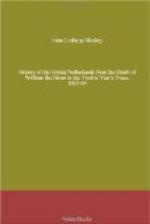Title: History of the United Netherlands, 1603-04
Author: John Lothrop Motley
Release Date: January, 2004 [EBook #4876] [Yes, we are more than one year ahead of schedule] [This file was first posted on April 15, 2002]
Edition: 10
Language: English
Character set encoding: ASCII
*** Start of the project gutenberg EBOOK history united Netherlands, 1603-04 ***
This eBook was produced by David Widger widger@cecomet.net
[Note: There is a short list of bookmarks, or pointers, at the end of the file for those who may wish to sample the author’s ideas before making an entire meal of them. D.W.]
HISTORY OF THE UNITED NETHERLANDS From the Death of William the Silent to the Twelve Year’s Truce—1609
By John Lothrop Motley
MOTLEY’S HISTORY OF THE NETHERLANDS, Project Gutenberg Edition, Vol. 76
History of the United Netherlands, 1603-1604
CHAPTER XLI.
Death of Queen Elizabeth—Condition of Spain—Legations to James I. —Union of England and Scotland—Characteristics of the new monarch —The English Court and Government—Piratical practices of the English—Audience of the States’ envoy with king James—Queen Elizabeth’s scheme far remodelling Europe—Ambassador extraordinary from Henry IV. to James—De Rosny’s strictures on the English people—Private interview of De Rosny with the States’ envoy—De Rosny’s audience of the king—Objects of his mission—Insinuations of the Duke of Northumberland—Invitation of the embassy to Greenwich—Promise of James to protect the Netherlands against Spain—Misgivings of Barneveld—Conference at Arundel House—Its unsatisfactory termination—Contempt of De Rosny for the English counsellors—Political aspect of Europe—De Rosny’s disclosure to the king of the secret object of his mission—Agreement of James to the proposals of De Rosny—Ratification of the treaty of alliance— Return of De Rosny and suite to France—Arrival of the Spanish ambassador.
On the 24th of March, 1603, Queen Elizabeth died at Richmond, having nearly completed her seventieth year. The two halves of the little island of Britain were at last politically adjoined to each other by the personal union of the two crowns.
A foreigner, son of the woman executed by Elizabeth, succeeded to Elizabeth’s throne. It was most natural that the Dutch republic and the French king, the archdukes and his Catholic Majesty, should be filled with anxiety as to the probable effect of this change of individuals upon the fortunes of the war.




